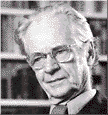B. F. Skinner
1904-1990
Burrhus Frederic Skinner was born in a small Pennsylvania town. His father was an attorney and his mother a housewife. His family life was described as old-fashioned and hard working.
Skinner received his Bachelor's degree in English in hopes of becoming a writer. He wrote for the school paper but saw himself as an outsider, being an atheist in a religious school, and often criticized the school and its beliefs. After graduation, he continued with his hopes of being a writer and worked for a newspaper, eventually moving to Greenwich Village in New York City.
He later returned to his life as a student and completed his Master's degree in 1931 from Harvard, and his Doctorate a year later, both in the field of psychology. He married that same year and had two children, one of whom became famous, or perhaps infamous, as the baby raised in an artificial environment known as an 'air crib.'
In 1945, he became the chairman of the psychology department at Indiana University and left to teach at Harvard three years later, where he spent the remainder of his career. Although he never became the writer he had dreamt of, he did write several books and hundreds of articles on behavior theory, reinforcement, and Learning Theory. Today he is known as one of the most published psychologists.
His biggest criticism of psychological thought was against the growing following of Sigmund Freud. Skinner believed that examining the unconscious or hidden motives of human beings was a waste of time, for the only thing worth researching was outward behaviors. It was this core belief that led him to reject most of the theories prominent in the field of psychology.
Concepts such as self-actualization and striving to reach one's potential, such as the belief held by humanists was rejected due to the inability to research such an abstract idea. The idea of inner drives such as Freud's Id, Ego, and Superego were seen as preposterous. And the defense mechanisms, archetypes, and drives merely gave theoretical names to ideas that are poorly understood and likely nonexistent.
Instead, Skinner focused on observable behaviors and spent the majority of his professional career refining his theories of reinforcement. He believed that personality develops, that our behavior responds only because of external events. In other words, we are the way we are because we were rewarded for being that way. It is this belief that discounts emotions, thoughts, and even human freedom of choice.
Skinner got most of his criticism due to his belief that through rewards and punishments, we could design the perfect Utopia. His most famous and most controversial books, Walden II and Beyond Freedom and Dignity, described his theory of behavioral determinism despite the protests and criticism from religious leaders and others. In 1990, Skinner died from leukemia but is known world wide, with the likes of Sigmund Freud, as a forefather in modern day psychology.
